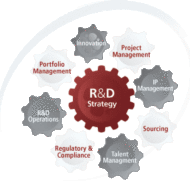Posted by Managementguru in Marketing, Principles of Management, Project Management, Strategy, Technology
on Mar 25th, 2014 | 0 comments

Research and Development – Strategic Key for Competitive Advantage Product Innovation and Process Improvement: With the increasing pace of liberalization and ferocity of competition in the corporate business world, it is mandatory for the firms to invest in research and development activities to sustain in the market. In most of the developing countries, scant attention has been paid to research and development activities. A survey indicates that countries like Japan and United States of America spend 2.8 percent of their Gross National Product on R and D, while it is a mere 0.9 percent of the Gross Domestic Product in the case of some Asian countries. What role does research & development play in the industry and economy? Why it is important for the developing countries to invest more on R and D? In spite of the tax rebate offered by most of the governments for R and D, why industries don’t contribute much to indigenous research? Global Competition: It becomes difficult for business organisations to compete in national and international markets both on quality and cost fronts, primarily because of absence of strong base in science and technology. Third world nations are used to buying technology from developed nations, that make them dependent and technology starved. Limited resource is another problem faced by these business firms, the allocation of which becomes difficult owing to rising costs. Invasion of Multinational and Trans national Giants: Another serious aspect to be considered is the invasion of multinational and transnational giants in every sector due to liberalization, globalization and privatization policies of the developing nations. This leads to panic in the industry, as a result of which, the business firms either go for forged alliances or infuse large amounts of funds into R and D activities hurriedly, both of which is a futile exercise to protect themselves from the onslaught of transnational companies. Science and Technological Advancement: The wiser move for the business firms to withstand the competition on an international level, would be to build their empires on a sustainable basis, by honoring the scientific and technological efforts. A thorough knowledge of all the research activities progressing around the world proves useful in managing their activities and operating with limited resources. This demands a long term plan that will support, strengthen and nurture the specified area of science base selected for research and development. Research Management: A well devised research management programme will help the business firms to formulate short and long term technical plans that aid in the research programme. It is very important for a country to encourage the budding population to become more research oriented, that will help the nation prosper in terms of science and technology, besides which, it also helps in the growth of one’s own economy. Chanakya’s 7 Secrets of Leadership The Research and Development strategic management lays emphasis on formulating plans, that support the short and long term objectives of a business firm, by employing innovative minds in the process and periodically reviewing and restructuring strategies in the light of changing demands of the society. The focus of an R and D manager should be on appraisal of technological and competitive environment, assessment of corporate strengths and weaknesses and making strategic decisions, while formulating R and D...

Posted by Managementguru in Economics
on Feb 17th, 2014 | 0 comments

Managerial Economics and Decision Making One has to observe the economic prospects of a particular #industry before venturing into it. Most of the people are not aware of the existence of some businesses with fantastic economic characteristics like high rate of return on invested capital, substantial profit margins and consistent growth. How do you think Bill Gates and Warren Buffet were able to make it on the Forbes top millionaires list? Successful leaders focus on the economics of a business for decision making. Economic Aspects of a Market Managerial economics is a #management science that gives you more idea about the economic aspects of a market and how they affect your decision making. This is very important because economic profits play a crucial role in a market based economy., While above normal profits are indicators of expansion and growth, below normal profits cautions you about tightening or retrenchment. Business economics is comprised of several tools of micro and macro economic analysis which are useful in management decision-making that act as facilitators to solve business problems. Micro economic instruments used in this context include demand analysis, production and cost analysis, breakeven analysis, theory of pricing, technical progress, location decisions and capital budgeting . Factors Influencing Management Decisions The macroeconomic concepts that are directly or indirectly related to management decisions include analysis of national income, business cycles, monetary policy, fiscal policy, central banking, public finance, economic growth, international trade, balance of payments, protectionism, free trade, exchange rates and international monetary system. The scope of management science is broad and is closely linked with economic theory, decision sciences and accounting. Traditional economics deals with theory and methodology of management, while managerial or business economics applies these theories to solve business problems. The tools and analytical techniques are useful in providing optimal solutions to business problems. Relationship with economics : Managerial economics borrows concepts from economics to idealize the strategic actions needed for decision making in a problem situation. The analysis of micro and macro economic concepts adds valuable information for the organization. Say, for example, national income forecasting is an important aid for the analysis of business conditions that in turn could be an invaluable contribution to forecast demand for specific product groups. Theories of market structure can be analyzed for market segmentation. Managers have the freedom to choose between the decision alternatives that best suits the objectives of the business enterprise. The challenge is to justify the alternative in terms of cost and benefit. Relationship with decision sciences : Decision models are created to format solutions for problem situations and the process uses techniques such as, optimization, differential calculus and mathematical programming. This also helps to analyze the impact of alternative courses of action and evaluate the results of the model. Economic models provide the organizations with the necessary insight concerning value maximization Relationship to Accounting The accounting data and statements constitute the language of business. The accounting profession has a significant impact on cost and revenue information and classification. A manager therefore must be familiar with the generation, interpretation and use of accounting data. Accounting is also seen as a decision management tool and not as a mere practice of book-keeping. The concepts and practices of accounting can be well applied to improve the economic scope of a project. Economic theory is all about allocating scarce resources between competing ends and managerial economics advocates rules for improving managerial decisions and for efficiently achieving the goals of an...




